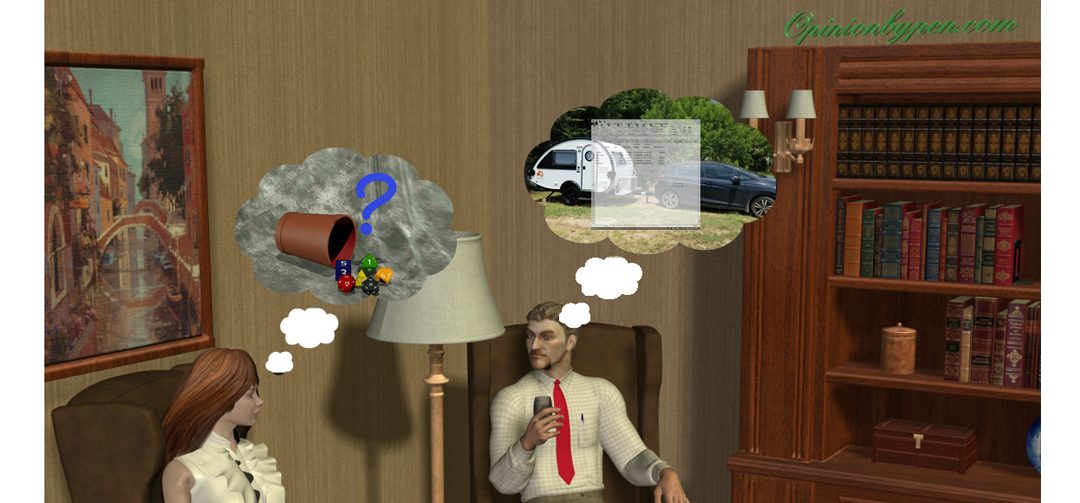 I’ve written a number of posts about how engineers think and make decisions, so I was stunned when my Wife questioned my decision making process and demanded details. My first response was to deny any malfeasance on my part but when I recovered my composure I realized she might have a point.
I’ve written a number of posts about how engineers think and make decisions, so I was stunned when my Wife questioned my decision making process and demanded details. My first response was to deny any malfeasance on my part but when I recovered my composure I realized she might have a point.
Having admitted that to myself, I immediately attempted to justify my behavior. How could she possibly understand all the elements that go into my decisions? There’s no way I can explain all the engineering details supporting my decision. She simply doesn’t have the background to understand all the technical details, may as well try to explain magic to a muggle. Not wanting to spend the rest of my life eating Brussel sprouts, I keep my thoughts to myself.
 With self preservation frustrating my very logical justification, I turn to anger. How dare she question my decision making process? She wasn’t even interested when I whipped up a spreadsheet to show her that raising chickens for eggs can never reach the break even point. She only muttered something about me totally missing the point and how fresh eggs taste better.
With self preservation frustrating my very logical justification, I turn to anger. How dare she question my decision making process? She wasn’t even interested when I whipped up a spreadsheet to show her that raising chickens for eggs can never reach the break even point. She only muttered something about me totally missing the point and how fresh eggs taste better.
The truth is that my entire process usually boils down to justifying a decision I’ve already made. Yes, I actually do the research. I will peruse reviews for days on end looking for data to justify my decision. What that means is that the desirability I attach to specific attributes is a little, shall we say fuzzy. This allows me to adjust parameters on the fly so I still end up with my choice. Admittedly on rare occasions, I will find my original selection is so far from my goals that I have to change my mind but those are very rare.
 When my Wife asked me what criteria I used to pick my Honda, I had to find parameters where my choice, Honda, was superior to the Kia. The fact that the Kia cost less and seemed to have more power forced me to raise the desirability of a good sound system. In hindsight, that turned out to be a really bad criteria. I haven’t used my Honda’s entertainment system in over a year because the interface with my Android phone is so bad. At least it looked good on paper.
When my Wife asked me what criteria I used to pick my Honda, I had to find parameters where my choice, Honda, was superior to the Kia. The fact that the Kia cost less and seemed to have more power forced me to raise the desirability of a good sound system. In hindsight, that turned out to be a really bad criteria. I haven’t used my Honda’s entertainment system in over a year because the interface with my Android phone is so bad. At least it looked good on paper.
This brings me to an equally important element, when I make a decision, I don’t look back. From the moment I announce the decision, I focus on ensuring that my decision is a good decision. I never look back and wonder if I made the right decision. You know, wondering if the Kia entertainment system is equal to or better than my Honda. When I make a decision, I don’t second guess myself. I don’t spend endless time wondering if it was a good decision. Instead I move on to the next phase of the decision making process, working to ensure this was the right decision.
Having entered this phase of the process, when my Wife asks me what criteria I used to make my decision, the only possible reason is that she’s trying to make me reconsider my decision. She may be right but she’s out of phase with my process. My entire focus has now moved to implementing the decision. Anything she brings up now is only a distraction to my goal.
Although she really doesn’t care what I drive, there are decisions that my Wife wants to be part of. This brings up the question, how can she be involved in those decisions? I’ve already admitted that many of my decisions are made on a purely subjective basis. When she asks me what I want for dinner, I don’t open up a spreadsheet to review my nutritional needs. I select one of my favorite meals on a random basis and start priming my tastebuds to enjoy my choice.
When I wrote about arguing with an engineer, I told you that the engineer was already invested in his decision. The way to win that argument is to question the data. The situation here is not that different except that introducing new data after I’ve made a decision will do nothing to change my mind. If my wife tells me we’re out of cheese, I’m so far invested in my food cravings that I’ll probably go to the store for cheese.
About the only thing she can do to make me re-evaluate my decision is to change the requirements on me. For example, if my dinner choice involves a nice shepherd’s pie and she responds that baking is out because the oven isn’t working, I will reluctantly come up with a new choice.
My example of the oven illustrates how the difference between a new requirement and data can be blurred. This difference is important to the engineer because introducing new data suggests the engineer failed to do his research properly. On the other hand, new requirements provide a valid reason (excuse) to re-evaluate a decision.
Living with an engineer in the house is never easy. Trying to sway an engineer’s decision process can be even more complicated. Used carefully, this insight into our decision making process might, just might, make your life slightly less frustrating.

© 2018 – 2019, Byron Seastrunk. All rights reserved.











Love the post. It was entertaining and informing as usual!